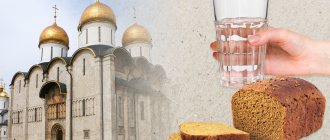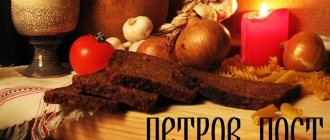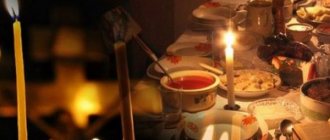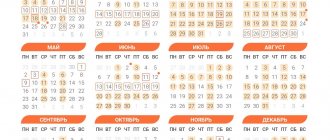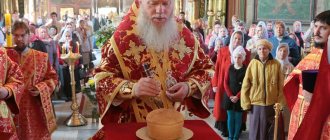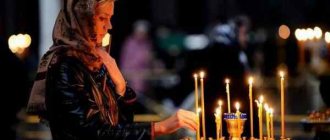In the last month of summer, Orthodox people celebrate the Assumption Fast. In 2022, it begins in the second part of August, from the 14th, and ends on August 27. At the end of the fast, a special celebration is celebrated on August 28 - the Dormition of the Blessed Virgin Mary, so fasting carries the meaning of purification and repentance, and is a preparatory stage for a large Orthodox holiday.
When is the Assumption Fast in 2022?
Every year, Orthodox Christians have a period in August during which they refuse fast food.
The Mother of God Fast (also called the Assumption Fast) according to the church calendar lasts 14 days. Its beginning completely coincides with the Feast of the All-Merciful Savior, which is celebrated on August 14. The last day is 27.08. The dates for fasting are fixed.
According to the church calendar, Orthodox Lent in August 2022 will begin on Sunday, August 14. It ends on Saturday, August 27th.
On the day when the last week of the Dormition Lent ends, believers celebrate the Holy Forefeast of the Dormition of the Mother of God. The celebration itself will be celebrated on August 28, 2022. People call the Fast of the Most Holy Theotokos Spasovka (the name comes from the Honey (August 14) and Apple (August 19) Spas). The next autumn post will be one-day. It falls on September 11th.
The day before the beginning of the Fast of the Mother of God, a conspiracy is performed: believers are allowed to eat food of animal origin.
What does the Assumption Fast mean and what is associated with it?
The appearance in Orthodoxy of the fast called “Assumption” is associated with certain events - the Dormition of the Virgin Mary. The Mother of God received the news of her transition to eternal life from the Archangel Gabriel. The apostles, having learned about this, gathered on the appointed day at the time of the Assumption to see her off by reading prayers. Everything happened as the archangel said - at three o’clock the Mother of God departed to the Lord.
The body was placed in a coffin, which was taken to the cave in the evening, and the entrance to it was blocked with a large boulder. Three days later, when the Apostle Thomas wanted to say goodbye to the Mother of God, the body was not found in the coffin. The news quickly spread throughout the area, and everyone learned that the Mother of God had ascended.
During the evening meal, she appeared to the apostles and said: “Rejoice! I am with you all the days." The disciples of Christ, picking up part of the bread, said: “Most Holy Theotokos, help us.” As a memory of this, at monastery services they perform the rite of panagia - in honor of the Mother of God they offer a portion of the bread.
From ancient Greek the word “dormition” is translated as “to fall asleep,” “to sleep,” to rest,” “to die.” In Church Slavonic it is used to mean a peaceful death or falling into sleep.
During Lent, which began to be called Dormition Lent, believers prepare for the main festival - the Dormition of the Mother of God, which falls on August 28. The way of life of the Mother of God was distinguished by abstinence, her soul was immaculate and pure, therefore those who fast prepare for the celebration of the Dormition by cleansing the soul and body.
History and essence of the Assumption Fast
Every parishioner of the Orthodox Church knows what church holiday is August 27th. On this day, the multi-day fast will end, and the Forefeast of the Assumption will take place. The essence of abstaining from food of animal origin and limiting oneself to entertainment activities is considered to be the preparation of soul and body for the Great Church Celebration.
When we eat simple food, pray and do not allow bad thoughts to arise, we become closer to our Lord and the Most Holy Theotokos. The stronger the restrictions, the easier it is to ask the Holy Virgin for intercession. Achieving purity of soul and body is the main goal that people achieve when they fast.
Summer fasting has been known since the 5th century. At that time, people fasted every season of the year. Despite the fact that Spasovka fell in the second half of August, this time was called autumn fasting. At first it was established for people who, for some reason, could not fast during Lent.
They abstained from fasting meals starting in June (a week after the celebration of Trinity), and the end of the fast fell on the day before the Dormition. Later, this period was made shorter, it was limited to the feast of Saints Paul and Peter. The final approval of Spasovka took place in 1166 in the ancient cathedral in Constantinople.
Second courses for the Lenten table
The choice here is huge: vegetable stews, baked, stewed, boiled potatoes, cabbage with mushrooms, porridge with vegetable oil, bean pate, pea puree - you can’t list it all. In addition, you can fry and bake zucchini, make eggplant caviar, stuffed peppers with rice and mushrooms, etc.
Mushroom pilaf
A very common hearty and tasty dish for any fast.
Products for 3 servings:
- rice (preferably long) – 1 cup;
- mushrooms – 200-300 g;
- onions – 1-2 pieces;
- medium carrots - 1 piece;
- frying oil;
- seasoning for pilaf;
- water – 3 glasses;
- head of garlic.
Cooking process:
Cut the onion into cubes, the beets into cubes. Fry in oil in a casserole.
Add washed rice and fried chopped mushrooms.
Pour in water, add spices, put inside a head of garlic, peeled from the top husk. Close the lid and turn on the heat. After boiling, reduce it and cook for 0.5 hours without removing the lid. Leave for another 15-20 minutes.
What can you eat and drink during the Assumption Fast?
If you study in detail the information described in the Church Charter, you can understand that in its severity, the Theotokos Fast is not inferior to the Great Fast. At this time, it is not recommended to consume dairy products, all types of meat, and eggs. The Lenten table of any believer should be represented by such dishes as: potatoes, nuts, vegetables, berries, mushrooms, fruits.
On some days of the week, a dry diet is strictly prescribed, which consists of bread, salt, water, unprocessed steamed vegetables and fruits, dried fruits, nuts, and flower honey. These days fall on Monday, Wednesday and Friday. On Tuesdays and Thursdays it is allowed to consume hot food without adding oil. On weekends, meals consist of hot food with butter. These days you can drink a little dry red wine.
When the church celebration of the Transfiguration (19.08) is celebrated, believers can eat fish dishes and drink wine in small quantities. This can be done on any day of the week on which a great holiday falls.
All of the above requirements are mandatory for church ministers and monks. The laity may not adhere to the full rigor of fasting. When parishioners attend church, they can coordinate the meal schedule and calendar with their mentors. Features such as health status and life circumstances are taken into account.
People who have been suffering from chronic illnesses for some time must obtain permission from their doctor before starting to fast.
For which persons are concessions made?
- for people engaged in heavy physical labor;
- for military personnel;
- for students.
Pregnant women and nursing mothers are completely exempt from any restrictions. Children should also not be asked to fast. It is enough to limit them from excess consumption of flour and sugar.
How to prepare and smoothly enter the fast
The Dormition Fast is the shortest fast. It lasts two weeks, but in its severity it is equal to Lent. It occurs at the end of summer, when nuts, vegetables, fruits, and herbs are abundant on the tables. This will allow you to eat a varied, tasty diet, while receiving the necessary vitamins and nutrients in full. The Dormition Fast does not require careful preparation, however, for people who are fasting for the first time or have a hard time with gastronomic restrictions, it is better to adhere to some rules:
- It is better to start preparing for fasting 1-2 weeks in advance. Gradually reduce meat and dairy products in your diet. Before fasting, you shouldn’t try to eat up these foods for good measure.
- Get your body used to fiber. The basis of a lean diet is plant foods, which contain dietary fiber in large quantities. To avoid discomfort associated with digestion, eat salads daily and add bran or fiber to prepared meals.
- Drink enough fluids. Drinking 1.5-2 liters of clean water daily will improve intestinal function, eliminate dehydration and experience less hunger.
- Maintain the balance of intestinal microflora. A sudden change in diet can disrupt the microflora. To populate the intestines with beneficial bacteria, consume fermented milk products daily: starter cultures, bifidoyogurts and kefirs, fermented baked milk, yogurt.
- Lenten foods are lower in calories. In order not to feel hungry in the first days of fasting, you can increase portions, add additional meals or snacks of fruits, vegetables, and nuts.
What can you drink
Red wine is allowed to be drunk on Saturdays and Sundays, as well as on the Great Feast of the Transfiguration. On other days, you should abstain from alcohol. You can drink purified water, fruit drinks, dried fruit compotes, and herbal teas every day.
Changing your usual diet can cause discomfort in the stomach and intestines. To avoid unpleasant symptoms, you should drink at least 1.5 liters of liquid daily. The best way to quench your thirst is to drink clean water. A large amount of fluid will help avoid dehydration and cleanse the body of harmful waste and toxins. A glass of water will be a good salvation from frequent snacking and will help prevent overeating.
Feast of the Dormition of the Virgin Mary
The Slavic word “dormition” means “sleep”. In Christian vocabulary, this is the name for a person’s special departure from this world. It is much closer in nature to sleep than to death. Usually this concept is applied to the end of the earthly days of the Mother of God. The Assumption Fast is associated with this event.
After the Ascension of Jesus Christ (on the fortieth day after the Resurrection), the Mother of God lived with the Apostle John the Theologian. According to Holy Tradition, She, like the apostles, preached the Christian faith. Her lot fell to go to Iveria (modern Georgia). However, by the Providence of God, the Most Holy Theotokos landed on a ship on the shores of Mount Athos.
The blessing of apples on the Feast of the Transfiguration is one of the traditions of the Dormition Fast.
The Mother of God prayed incessantly, wanting to be close to Her Son. She was informed about her approaching death by the Archangel Gabriel. By this time, all the apostles miraculously gathered in Jerusalem to say goodbye to the Mother of God. Among them, only the Apostle Thomas was not present. The Savior Himself with many angels appeared to receive the most pure soul of His Mother. Her death was like a peaceful sleep.
“In such a wondrous death of the Most Blessed Virgin Mary, to the consolation of all Christians, the power and greatness of our Lord Jesus Christ was especially solemnly revealed, Who by His death and Resurrection crushed the sting of death and from a terrible and painful one made it joyful and blessed for His faithful followers. We see the most obvious example of triumph over death in the Assumption of the Blessed Virgin Mary” (Archimandrite Kirill Pavlov).
Nutrition calendar by day
| Date, day of week | What can you eat according to the Church Charter? |
| 14.08, Sunday | Hot food with added oil. A small amount of red wine. |
| 15.08, Monday | Dry eating (bread, salt, water, raw vegetables and fruits, dried fruits, nuts, flower honey). |
| 16.08, Tuesday | Hot food without adding oil. |
| 17.08, Wednesday | Dry eating (bread, salt, water, raw vegetables and fruits, dried fruits, nuts, flower honey). |
| 18.08, Thursday | Hot food without adding oil. |
| 19.08, Friday | Fish dishes, seafood, hot food with butter, wine. |
| 20.08, Saturday | Hot food with added oil. A small amount of red wine. |
| 21.08, Sunday | Hot food with added oil. A small amount of red wine. |
| 22.08, Monday | Dry eating (bread, salt, water, raw vegetables and fruits, dried fruits, nuts, flower honey). |
| 23.08, Tuesday | Hot food without adding oil. |
| 24.08, Wednesday | Dry eating (bread, salt, water, raw vegetables and fruits, dried fruits, nuts, flower honey). |
| 25.08, Thursday | Hot food without adding oil. |
| 26.08, Friday | Dry eating (bread, salt, water, raw vegetables and fruits, dried fruits, nuts, flower honey). |
| 27.08, Saturday | Hot food with added oil. A small amount of red wine. |
Question of the week: how to spend the Assumption Fast
Summer is coming to an end. For some, this is a time of rest (summer holidays are in full swing), for others it is a time of suffering (harvesting, preparations for the winter), for schoolchildren and their parents it is a hectic preparation for the new school year.
And like the crown of summer, the Assumption Fast comes.
How to spend these two weeks of fasting and the passing summer with maximum benefit for the soul? Archbishops and shepherds answer this question: Archbishop of Pyatigorsk and Cherkessk Theophylact, Bishops of Orsk and Gai Iriney, Tara and Tyukalinsky Savvaty and Akhtubinsky and Enotayevsky Anthony, Archimandrite Raphael (Karelin), Archpriests Andrei Tkachev and Alexander Avdyugin, Priest Dimitry Shishkin.
Archbishop of Pyatigorsk and Circassia Theophylact:
– After all, the Dormition Fast, although it falls in the last two weeks of August, is an opportunity to consciously prepare for the day of the Dormition of the Blessed Virgin Mary, and not the crown of summer.
For a person, the change of season is unlikely to be as significant as, for example, for a bear. The bear hibernates in the winter, and in the summer it gains vitamins and microelements to survive this hibernation. In today's world, you can find a suitable holiday destination regardless of the time of year.
So your question rather touches on the topic of life priorities.
It would be fair to admit that my view on this topic is specific, monastic. If we add seminary years to the years of tonsure (and seminary life in the early nineties was built on monastic models), it turns out that most of my 41 years I live according to the monastic rule. And that means, from a layman’s point of view, I fast all year round and participate in divine services almost every day.
For a monk, the rules by which our Church lives are completely familiar and natural, because these are originally monastic rules, determining the structure of life in the monastery - from the course and duration of services to the rules of meals. This feature of the Typikon today serves as a reason for numerous conclusions about the need to leave the Jerusalem Rule only to monks, and to develop another one for parishes and parishioners. But this is a completely separate topic.
I repeat, for a monk, at least for a monk living in a monastery, fasting for many days is not something extraordinary, but simply increased restrictions on meals, greater concentration on prayer.
If a person’s life and actions are determined by faith, he will not experience discomfort from fasting
As for the laity, it is more difficult for me to speak. But still, having a large circle of friends, I notice that external observance of the rules of fasting directly depends on the internal structure, on the structure of spiritual life. If for a person church life ends with a wedding, the baptism of children, the funeral service of relatives and friends, he will most likely perceive the Church as a complex of ritual services, and therefore he will perceive church rules and norms as artificial and unjustified restrictions.
This approach is encountered when organizing catechetical conversations, when the recipient sincerely does not understand why he needs to learn some prayers and read some books, when he just wants to become a participant in a beautiful ceremony.
For such people, of course, giving up food of animal origin for two weeks is not very clear.
And on the contrary, if a person’s life and actions are determined by faith, he will not experience discomfort from fasting.
Bishop of Orsk and Gai Irenaeus:
Bishop of Orsk and Gai Irenaeus
– It’s best to spend the remaining summer weeks at home, preparing for the new school year, for new exploits. To do this you need to get yourself together well. It is wise that this post exists on the eve of the new school year. This is the time when a Christian takes stock, analyzes what he managed to do and what he did not.
The Assumption Fast is a period of harvesting and active procurement of food and other necessary supplies for the winter. It’s good that there is such time, and it needs to be used as correctly and profitably as possible.
To those Christians who went on vacation during this time, I can only advise one thing - next year, plan your vacation earlier, before the Dormition Fast. It is better to prepare for new exploits, for the school year, for winter.
Bishop of Tara and Tyukalinsky Savvaty:
– After reading the question, at first I was exhausted with bewilderment, wondering what to advise. One person enjoys one thing, another another. Emptiness filled all horizons of thought, and a desire arose to refuse to answer.
The next day, after church service, I thought that the rest of the summer should be perceived not as part of time, but as a door to eternity. Each period of time holds a secret. He simultaneously opens the door for us either to eternal bliss or to eternal torment. What is the goal of all life should also be the goal of every part of life. If there is no goal, then, as Seneca said: “No wind will be favorable to us!”
What the work of our whole life gives us, each individual work should bring us closer to it.
It’s difficult to say what exactly to do. This, on the one hand, is very individual, according to each person’s talents, and on the other hand, one of the ancient fathers said: “Aren’t all things equal?” From a human point of view, an equally difficult question is: how to eat correctly? But the answer must be sought not from oneself, but from God. The fathers say that if you get up from the meal and want to pray, then you have eaten correctly. Likewise, St. Augustine answers: “Love and do what you want.” And the Monk Seraphim of Sarov warns that any work not done for the sake of Christ is not saving. This means that not only in the sense of time, but also in the practical sense, what the work of our whole life gives us, each individual task should bring us closer to that.
God is love. All His commandments can be collected into two: about love for God and love for neighbor. To teach this, God planted paradise in Eden, and two schools of love on earth: the family and the monastery. In paradise, Adam had to extend paradise to all of Eden, and Eden to the whole earth. On earth, a person, having learned to love his family, must spread his love first to his neighbors, and then to those far away, starting with his enemies. The Lord Jesus Christ himself, when he came to earth, accomplished this work. Showing an image of love, giving himself up to be crucified to atone for the sins of the crucifiers. In a family, we must learn to love the bride, then the wife, then the pregnant wife, the wife with children, and then the wife in old age. At each step we must expand our heart so that it can accommodate God’s commandment of love in ever newer and newer horizons. We must also learn to love teaching, work, Motherland, sorrow and once again enemies. And when we love everything, nothing can knock us out of the saddle. Nothing can snatch us from the power of the commandment: “Rejoice, pray without ceasing, give thanks in everything.” We, in the words of St. John Chrysostom, “will have joy in the absence of sources of joy.” Here the joy of labor, compulsion and sacrificial love, and there the joy of thanksgiving will turn into eternal bliss with the saints and angels.
May the light of Christ's love enlighten us on how to open the door on which Christ will knock on our hearts on every day of salvation given to us for the remainder of the favorable time, the year of the Lord!
Bishop Anthony of Akhtubinsk and Enotaevsk:
Conversation between Bishop Anthony and young Cossacks
Our children should also feel the limitations of the usual order of life during Lent.
– I would like to address my wishes first of all to parents and children. Summer is a time of some relaxation, disruption of the usual rhythm of life, daily routine and activities. Fasting is a time of restrictions, voluntary restrictions for the sake of the Lord. For children, food indulgences are quite acceptable, but in the sense of limiting the usual order of life, fasting should also be felt by our children. And they must be told about this: our children are capable of much for the sake of Christ.
It is very important that during the fasting period parents help their children prepare for the new school year.
In this sense, it would be good to start going to bed and getting up at the same time, close to the time you get up during the school year. It may be worth brushing up on your knowledge of the past school year. It's time to limit your time on computers and other time wasters.
And, of course, the rhythm of spiritual life should also be restored if it is disrupted in the summer. The rule of prayer and more frequent visits to church should return to life again, fortunately the Dormition Fast is rich in special solemn days of worship.
Speaking about how the lives of children should change, I urge parents to set an example, and not just directively educate their children. Only by going through the feat of fasting together will we be able to pass on to our children the experience of spiritual life.
God's help to everyone. Let's fast with a pleasant fast!!!
Archimandrite Raphael (Karelin):
Archimandrite Raphael (Karelin):\
We must preserve what is contained in church tradition, and not replace Christianity with anti-ascetic humanism
– We must conduct fasting in accordance with the charter of the Church, and not with the seasons. Can the charter be changed? Unfortunately, many modern Christians strive to create a comfortable Christianity, where the struggle with sin and passions living in every person would be reduced to a minimum. In my opinion, we must preserve what is contained in church tradition, and not replace Christianity with anti-ascetic humanism.
God bless you!
Archpriest Andrey Tkachev:
Archpriest Andrey Tkachev
– Based on the fact that “our northern summer is a caricature of southern winters,” the end of August and the beginning of autumn need to be caught. These are short days. A true “Indian summer”, that is, something last, passing, residually hot and therefore sad and beautiful.
But, firstly, you need to be able to enjoy nature, and secondly, you need to have time for it. A person, wrapped up in the hustle and bustle, shaking in transport, painfully thinking about problems, tends to not really distinguish July from August. And such people are the majority. In winter and summer they have asphalt, concrete and exhaust fumes, and besides that I don’t even know what else they have. Unless the cell phone is always ringing.
But happy is whoever has a piece of land with a roof over his head, away from the city, in nature. Happy is the one who walks barefoot in the dew and picks berries from his bushes. If at the same time he reads the Psalter or reflects on the Gospel, then he is no longer happy, but blessed. But the one who gets the children ready for school is also happy. Not because he enjoys peace (what peace there is when hearing the words “school” and “children”!). Happy because he invests in the future and does not live in vain. He spends his energy, time and money not on himself, his loved one, but on the fruit of his womb, which is the first step away from corroding egoism.
Let everyone be in church these days
But above all this is the great holiday of the Transfiguration and the touching holiday of the Assumption, which crowns the summer. Let everyone memorize the troparion and kontakion of both holidays. Let everyone understand what it means: “On the mountain you were transfigured...” and “In the never-sleeping prayers of the Mother of God...” Let everyone be in church these days - both the evening before and in the morning at the Liturgy. Then his summer will end well, regardless of whether he has a dacha, whether he has children and whether these children are moving on to the next class.
Archpriest Alexander Avdyugin:
Archpriest Alexander Avdyugin
– Saint Simeon of Thessalonica writes: “Some, however, say that the Assumption Fast was established on the occasion of two holidays, that is, the Transfiguration and the Assumption. And I also consider it necessary to remember both of these two holidays, one as giving us sanctification, and the other as propitiation and intercession for us.”
So, initially – God’s sanctification of this year’s harvest. After all, no matter how we improve technology, no matter how we come up with various food substitutes and additives, if the Lord does not bless to grow and does not sanctify the fruits given by Him, then we will have nothing to eat.
This is a fact that everyone understands.
Then we petition the Most Pure One, so that She may persuade Her Son to have mercy on us.
Why exactly these days? So winter is ahead. In days of cold and the death of nature, you can’t get by with just a fur coat and a stove. You need to work hard so that it doesn’t blow, doesn’t get wet, and doesn’t freeze.
In state and secular organizations, events for the coming winter are being developed in the spring, so that after counting the autumn chickens there will be no rush jobs. But here’s the problem: no matter how you plan, you cannot do without regular annual “cataclysms.” A spiritual person, who defines himself as Orthodox, understands perfectly well that without God one may not survive the winter. It doesn’t really work out to turn to Him on days of quick rest.
So the Dormition Fast is a wise institution. I would even risk adding a popular definition to the saint’s words: “The Dormition is the epiphany of the mind.”
For a priest, after the celebration of the three feasts of the Savior and the Solemnity of the Theotokos, children’s eyes at prayer services before the start of the school year say a lot and involuntarily force them to sincerely pray.
Sin then begins when, amid the bustle of entertainment, one forgets that the days have already come when the word “need” exceeds the verb “want.”
There is no harm in improving your health and gaining strength on vacation or at a resort during the Dormition Lent. Sin then begins when, behind the bustle of pleasures, bliss and entertainment, one forgets that the days have already come when the word “need” exceeds the verb “want”.
Golden autumn is only for those who “dissuade it with the cheerful tongue of a birch tree” who remember the Krylov dragonfly, which “sang red summer, did not have time to look back when winter was rolling into their eyes.”
So, although the Assumption Fast is an ancient institution, it is always relevant and quite modern.
Priest Dimitry Shishkin:
Priest Dimitry Shishkin
– The purpose of fasting is to get closer to God, limiting oneself in everything that interferes with spiritual life, and, on the contrary, devoting more time, attention and energy to prayer, reading the Holy Scriptures, visiting temple, works of mercy... In this sense, with a sincere desire During fasting, there are very few circumstances that truly hinder it. And in preparation for the new school (work) year, fasting, of course, is not an obstacle, because nothing contributes more to any preparation for a good deed than concentration, abstinence and prayer, to which fasting calls us. The same can be said about rural suffering: work for yourself and pray - what could be better?! Work helps you not to be distracted by vain and empty conversations. Preparing for school, going to school markets, although it seems like a vain task, even here you can be attentive and carry out your preparatory activities with prayer and heartfelt attention, refraining, first of all, from inner vanity.
Work for yourself and pray - what could be better?! Work helps you not to be distracted by vain and empty conversations
If we talk about vacations and tourist trips, then we must, first of all, get rid of the illusion. Sometimes it seems to a person that he needs to “relax completely,” that is, give freedom to passions in order to rest and gain strength for the coming year. But this is precisely an illusion and nothing more. Fasting is like some kind of mysterious door, which from the outside seems like something boring and painful, but one has only to make an effort and get closer to it, take hold of the handle, open it and enter - a person finds himself in a world so kindred and close to the soul , which very soon begins to understand: this is exactly what he really needs. With an honest and conscientious attitude to fasting, it is able to bring real joy, health and strength to the soul - and to the body. So at the end of fasting, a person experiences not the joy that “finally everything is possible,” but a subtle sadness that fasting is already ending and, due to natural weakness, it will be difficult to continue the ascent of grief, for which fasting, as a kind of external, disciplinary means, is so conveniently contributed. We may have a good desire, but we lack the strength to carry it out, while fasting, established by the Church, is a good and reliable helper for us in this.
Are you on vacation during this time? Spend it in memory of God
And all you need is to be determined to carry out the fast as it should be. Do not be afraid of his severity, but love and accept it, turn to God for help - and we will see how joyful fasting really is! Are you on vacation during this time? - Wonderful! Spend it not in mad revelry, but in the memory of God, in reverent concentration and in reasonable abstinence; fill your free time with reading holy books and thinking about what you read; while enjoying the beauty of nature, replenish your experiences with prayer; when communicating with loved ones, be consciously condescending, patient and benevolent - that’s what fasting will be for you. Even if you are forced to eat something modest in the dining room, observe the measure of abstinence: do not get drunk on alcohol, do not indulge in gluttony, and perhaps you can choose a Lenten menu, depending on the circumstances. If not, let this be a reason to reproach yourself once again: why didn’t you think in advance that a strict fast was coming? Why didn’t you take care to fast properly? Now eat and reproach yourself, foolish one, because the purpose of fasting is largely in self-reproach and contrition of heart. The Holy Fathers say: “Better is a weak conscience than vain virtue.” As long as we don’t use these words to justify our carelessness.
You can benefit from any situation. There would be a desire! Have you gone on a trip? Wonderful! Is there a temple there? Eat. So find time to visit it, say, on Sunday, maybe with the whole family, stay at the service not for ten minutes, but from beginning to end, taste the sweetness of the fullness of the service! Isn't this wonderful? Isn't this relaxation and joy for the soul?
In a word, it’s all about the disposition of the heart, faith and good determination. And if the disposition of the soul agrees with the establishment of the Church, such a combination and agreement will only bring benefit, and benefit infinitely superior to everything that the entire “recreation and entertainment” industry can deliver to us. May the Lord help us to extract from the coming fast that blessed nectar of joy, which is so necessary for a soul darkened by passions and tired of a sinful life.
What prayers to read
During the period of abstinence from fast food, the Virgin Mary prayers should be read. For example, like this:
“Oh, Most Holy Mother of God, filled with God’s grace, rejoice and give us your joy. You are blessed among all the female representatives living on the sinful earth, blessed is your holy fruit. We thank you and pray for you because you gave life to the Savior of our souls. Amen".
Before starting the Dormition Fast, you need to read these words:
“Great Mother of God, immaculate and praised by all. Grant us sinners strength so that we can begin the fast with respectable deeds, and tune our body to abstain from everything earthly. Strengthen our faith so that we can bring joy to you with good words and good deeds. Pray for us, mother of our Savior, and we will constantly turn to Him with prayer for the forgiveness of our souls and the salvation of each of us. Amen".
Behavior rules
Church ministers remind that fasting is not a diet. First of all, you need to take care of your soul. First of all, the point is to limit pleasures, and not to refuse animal food. The main rule is not to burden yourself with gluttony and drunkenness.
How to fast
The saints always fasted strictly and advised others to prepare for saving and great deeds with the help of fasting, since it is called upon to make the bodily nature strong and light, capable of obeying the demands of the spirit.
You should get used to it gradually. A person who has never fasted before is more likely to ruin his health than to come closer to holiness. To avoid impatience and irritation, each person must determine how much food and drink he needs per day, and gradually reduce this amount to the minimum necessary for life.
What to do in the post:
- pray;
- repent;
- attend church services;
- do as many good deeds as possible.
What not to do
Fasting is a time for repentance and prayer, so abstinence from all kinds of entertainment is recommended.
What is prohibited to do:
- get married;
- organize weddings and other celebrations;
- take part in all kinds of entertainment events;
- drink alcoholic beverages;
- envy;
- swear;
- make a scandal.
According to legend, if young people get married on these days, they will never be happy. It is better to carry out all important events before or after fasting.
Who may not fast:
- seriously ill;
- pregnant women;
- nursing mothers;
- military personnel;
- workers engaged in heavy physical labor;
- travelers;
- children under 7 years old.
Do's and don'ts
It is wrong to think that fasting is just abstaining from food of animal origin. The severity of restrictions is determined individually and may be different for each person.
First of all, observing church fasts is leading a spiritual lifestyle aimed at cleansing not only the body, but also thoughts.
- Reading prayers and devoting oneself to good deeds - this is what you need to pay attention to during this period.
- You should also avoid attending entertainment events, quarrels and swearing with people.
- Children can be baptized on any day if the date of the event is agreed upon with the church minister.
- It is not prohibited to register a marriage at the registry office, but weddings are not blessed at this time. They say that young people who get married during this period will not have happiness.
- It is better to avoid long trips. If you are planning a trip to holy places, then you should not refuse it.
- Free time should not be wasted on trifles; it is advised to devote it to working on your spirituality, as well as communicating with loved ones.
- It is recommended to abstain from marital intimacy during this period. Fulfillment of a duty is possible only with the consent of both parties. It is better not to plan to conceive a baby at this time. But if the child is conceived, then there is no need to worry: his fate will not be unhappy.
- You can read any literature, the main thing is that it contributes to the spiritual development of the individual. Particular attention should be paid to books with religious content.
Lenten nutrition
When observing fasting in August, you must remember its severity. It is recommended to eat only products of plant origin; food of animal origin is prohibited. More specifically, nutritional rules (including by day) are written down in church calendars.
Allowed food
At all times, you should eat only the listed products, but the menu turns out to be quite pleasant, since it may include an abundance of fresh honey and various sweet honey pastries.
The list of permitted products includes:
- fruits;
- vegetables;
- decoctions;
- teas;
- compotes;
- brown bread;
- honey;
- mushrooms;
- cereals;
- nuts.
Forbidden food
The church charter presupposes strict abstinence, but the fasting person determines its degree for himself, based on his state of health, lifestyle and the advice of his confessor. This fast is given to strengthen mental strength, and not to weaken physical strength, especially at the very end of the summer healing period.
Excluded from the meal:
- eggs;
- meat and all meat products;
- milk and all dairy products;
- fish (allowed only once - August 19);
- non-lenten baked goods and sweets;
- fast food;
- alcohol;
- abuse of sugar, spices and salt.
How to ask and give thanks in the last week of Lent
There is one tradition that is usually observed during the last week of Lent. At this time, it is customary to ask for forgiveness from everyone whom you have offended, and to thank people for simply existing on this earth. This must be done sincerely. If a bad deed has been committed, then you should completely repent of it. You should regret not only what you have done, but also what you accidentally said. There is no need to put a feeling of awkwardness or justification into the word “sorry”; the request for forgiveness should come from a pure heart.
It is also recommended to thank others at this time. This is done with the following words: “Thank you for existing.” Thanksgiving should be expressed not only in verbal form, it should fill the soul.
Good news
When the time came for the end of Her earthly life, Mary saw the Archangel Gabriel. Once he brought Mary great joy that She would become the Mother of the Savior of the world. This time the news was completely different: in three days She would go to the Lord.
For the Mother of God this was very joyful news, because She would meet her dearly beloved Son. In her last days, the Mother of God lived in the house of the Apostle John. Here, in a miraculous way, other apostles gathered who preached Christ in different countries of the world. Only the Apostle Thomas was missing.
The Mother of God thanked everyone who came to say goodbye to Her, and promised to protect and help all people, even after leaving for Her Son and the Lord God. She promised not to leave anyone orphaned, to visit and supervise everyone.
When the Dormition of the Holy Virgin took place, Christ himself, surrounded by angels, appeared to receive Her soul and lead her to Paradise.
Folk traditions and signs
People have long believed in omens, some of them become peculiar signs of fate. If, while picking apples on the first day of fasting, one of them falls on a person’s head, he will soon receive some profit. If a nut falls on the head, the person will be lucky. When someone is doused with water on the first day of abstinence, he will be healthy for a whole year. If he himself falls into the river, then he will be rich and not know the need.
There are signs that are associated with different animals:
- In the old days, horses were given a choice: a whole armful of harvested hay and oats. If a horse reaches for oats, there will be a rich harvest next summer. If it’s for hay, then the mowing will be good.
- If a hare crosses the road on August 19, then expect good news.
- A fly landed on his shoulder - there will be good luck, the man killed it - trouble awaits him.
During the period of fasting, nature slowly begins to change. The days are not as warm as before. By the direction of the wind, people determined what the coming winter would be like:
- if from the north - cold;
- south wind – warm;
- it blows from the east - snowy;
- from the western direction - soft, but with plenty of snow.
There are signs for certain dates. For example: whatever day falls on Apple Day, so will January. If cranes fly south on August 20, then rainy autumn will come soon. If on August 23 the water in rivers and lakes is not rough, then autumn will be warm without rain. If a person dreams of something on August 24, then he needs to defend the service in the church: he has sinned greatly in some way.
Differences in other Christian denominations
The fasts, which arose in early Christianity and lasted 1000 years, changed greatly after the split of the church into Orthodoxy and Catholicism. The former followed the path established by the apostles, the latter began to make their own changes to the charters and rules. Then, when many Protestant movements emerged from Catholics, the attitude towards fasting underwent even greater changes.
Catholics observe only the Nativity and Great Lents, and then with their own nuances, but Protestants have a completely different attitude to this. They count. That you need to fast. When there is a need for this for a specific person - whether he or someone close to him is sick, problems in the family, at work, important matters lie ahead.
Peculiarity
Fasting is considered the strictest in Orthodoxy, where believers try to follow the monastic rules and abstain from eating certain foods for the entire time.
Of course, nutrition is not the most important thing; on days of fasting, people should strengthen their prayer, reflect on God, eternity, correct themselves, and cleanse themselves. Do works of mercy. In this case, everyone personally imposes a fast on themselves - complete fasting for a certain period, or partial, for several days or even hours. At this time, they pray earnestly, read the Bible, ask for forgiveness if they have offended someone, try to regain the favor of those with whom they were in a quarrel, and do good deeds.
How to bless the harvest correctly
During Lent there are three Spas: Honey, Apple, Nut. There is a long-standing tradition of bringing gifts of nature, grown and collected with one’s own hands, to church. I put the gifts in a specially prepared place, candles are placed next to them, and a service is held. They say that consecrated honey, apples and nuts have healing powers that can relieve any adversity.
Origin of the Assumption Fast
Indications of the Assumption Fast are found in sources of the 9th century, and as for the Typikons themselves, for the first time an indication of the Assumption Fast is found in the Typikon of the Nikolo-Kasulyansky Monastery (12th century). The Council of Constantinople in 1166 finally approved a two-week period of fasting before the Feast of the Assumption. The Feast of the Dormition itself, like most feasts of the Mother of God, is based on Tradition, since the Gospel does not contain a word about the Dormition of the Mother of God. It is believed that the earliest known text about this event is called “St. John the Theologian’s Tale of the Dormition of the Holy Theotokos.” It is dated to the 5th century. The author signed the name of a famous saint in order to give significance to his text in the era of the beginning of the cult of the Blessed Virgin Mary. It is believed that this text served as the basis for the liturgical texts of the holiday, compiled by John of Damascus and Cosmas of Mayum, and also formed the basis for some iconographies of the Most Holy Theotokos (St. John the Theologian’s tale of the Dormition of the Holy Theotokos). However, according to another version, the holiday was established in ancient times, and the mentions of it that have reached us date back to the 4th century.
Questions and answers
| When can you fish during the Assumption Fast? |
| August 19, when the church celebration of the Transfiguration is celebrated. |
| Is it possible to have a wedding during the Assumption Fast? |
| You can sign at the registry office, but in general the church does not bless such marriages. |
| Is it possible to get married during the Assumption Fast? |
| No, they do not recommend getting married. |
| Is the Assumption of the Blessed Virgin Mary a fast day or not? |
| Lent ends on the eve of the Assumption. |
| Is there a post on August 28th? |
| No, it ends on August 27th. |
Restrictions on Spasovka - what the priests say
Since the period of any fast is a time of abstinence, in some cases parishioners doubt the advisability of this or that action and do not know whether it is among the prohibitions. We offer answers from church ministers to frequently asked questions.
Is a child baptized?
The Church Charter does not prohibit the rite of baptism during Lent. It is necessary to agree with the priest in advance, since he may be busy at work. It is better to choose a Saturday or Sunday for christenings - the duration of the services is shorter.
Is it permissible to hold a wedding, registration
Registration of marriage at the registry office is possible, but the church does not hold weddings during Lent. It is also not recommended to have a wedding, since entertainment, noisy and large feasts should be avoided during Lent.
Birthday or holiday coincided with fasting - what to do
It is better to postpone the celebration to the next weekend, when it is allowed to cook boiled food and use vegetable oil, which makes it possible to diversify the festive feast. In addition, you are allowed to drink a couple of glasses of light wine. But it is worth considering that riotous fun is not welcome.
Is it possible for children to fast?
Since dairy and meat are prohibited, and a growing body needs all these products, other restrictions are provided for children. For example, eat less or eliminate sweets altogether, and do not drink carbonated drinks. All this can be replaced with fruits and berries. If there are any doubts about this, then you should consult with the priest. Restrictions also apply to spending time on the computer or phone.
For whom fasting is not necessary?
Strict restrictions will be tolerated without problems only by healthy lay people who are not engaged in work requiring great physical exertion. Pregnant and nursing mothers, the sick, and people with chronic diseases may not fast—excluding a number of foods can harm the body.
Relaxations are acceptable for the military, heavy production workers, and students.
"Nut Spas"
“Nut”, “Bread”, “Third Spas” are the popular names for the holiday, which falls on the day after the Dormition. Sometimes the holiday is also called “Savior on Canvas”. Believers remember on this day the Transfer of the Image of Christ Not Made by Hands from Edessa to Constantinople (944). This image was called miraculous because it was not written, but was imprinted on a plate with which the Lord wiped his face during his lifetime. In the Russian Orthodox Church, the Savior Not Made by Hands has become one of the most beloved and widespread icons.
How should you fast?
Archpriest Igor FOMIN, rector of the Church of the Holy Blessed Prince Alexander Nevsky at MGIMO, says: Each person needs to determine his own measure of fasting. One can fast in full, and it will be good for him. Others, on the contrary, should weaken their fast. Sick people can fast not as strictly as is written in the Charter. Illness is also a kind of fasting, humility of the flesh. In addition, for some diseases, a gastronomic fast can be harmful to your health. Listen to yourself, ask your doctor for advice. Pregnant women have their own measure of fasting; in military personnel; for those who work in a stressful environment or study. Of course, a special topic is children's fasting. Sometimes it is better to agree with children that during fasting they will, for example, eat less candy, than to impose restrictions on them in dairy and meat foods. In any case, with all doubts and questions about fasting, I advise you to approach your confessor or priest whom you trust. The most important thing that “you cannot eat during Lent” is your neighbors. I'm talking about anger, irritation, quarrels and any other negative behavior that destroys peace between people. After all, when we act badly towards our neighbors, we destroy the bridge between us and God.
